FINA World Championships: Croatia Beats Japan 21:13, Takes 2nd in Group B
June 25, 2022 - Croatia and Japan met in Debrecen for their final match of Group B at the FINA World Championships in Hungary. By winning 21:13, Croatia takes 2nd place in Group B.
Ivica Tucak's team faced Japan in their final Group B match on Saturday evening. Greece and Germany will meet in the second match at 19:30. Before this game, Greece and Croatia had three points each at the top of the group, in which only the winner goes directly to the quarterfinals. Japan had two points and Germany was without points.
Croatia was able to secure first place in the group if they won by 12 goals or 11 if they scored more than 18 goals. Namely, their competitor for first place, Greece, defeated Japan 18:7 and set the bar high for the Barracudas. Croatia would finish 2nd if they beat Japan with less than 12 goals or a draw.
Match report
1st quarter
Croatia won the sprint and thus had the first attack of the match which did not result in a goal. Vukicevic scored Croatia's first goal for 1:0 with 6:27 on the clock and Vrlic made it 2:0 with 5:44 left. Japan scored their first goal 20 seconds later for 1:2. Japan scored a penalty with 4:50 left to equalize at 2:2. Japan led 3:2 with 2:55 left. Buric scored brilliantly for 3:3 with 2:35 on the clock. Buric scored again for 4:3 Croatia with 23 seconds to go in the first quarter.
2nd quarter
Croatia won the sprint and first attack in the second quarter as well, but Japan was first to score. It was 4:4 with 7:18 on the clock. Japan took the lead at 5:4 with 6:47 to go but Croatia soon equalized for 5:5. Japan retook the lead at 6:5 with 5:01 left, and it was 7:5 for Japan with 4:36 left. Kharkov scored for 7:6. Kharkov equalized for 7:7 with 3:28 to go until halftime. Japan retook the lead for 8:7 with 3:03 left. And it was 9:7 for Japan with 2:22 to go. Japan led 9:7 going into halftime.
3rd quarter
Fatovic scored for 9:8 with 6:57 to go. Japan went to 10:8 in the next attack. Fatovic scored for 10:9 with 6:11 left. Kharkov scored a penalty to equalize at 10:10 with 5:22 left. Krapic finally put Croatia back in the lead for 11:10 with 4:02 left. Krapic put Croatia ahead by 2 goals with 2:46 left. Popadic saved a Japan penalty 20 seconds later. Fatovic scored for 13:11 with 55 seconds left. Bukic scored for 14:11 to end the third quarter with Croatia up by 3 goals.
4th quarter
Japan was the first to score for -2 (12:14), but Vukicevic quickly put Croatia back to +3 (15:12). Krapic scored for 16:12 with 4:45 left in the match. Kharkov made it 17:12 for Croatia with 4:00 minutes to go. Krapic scored yet again for 18:12 Croatia with just under 3 minutes to go, and again for 19:12 with 2:15 on the clock. It was 20:12 for Croatia with one minute left. Kharkov scored for 21:12 with less than 30 seconds left. The match ended at 21:13 for Croatia.
Croatia thus finishes 2nd in Group B, meaning they will need to play in the round of 16. Croatia will play next on Monday for a spot in the quarterfinals.
For more, make sure to check out our dedicated sports section.
Ceremony "The West Gate of Croatia - For The Wounded Ukraine" Held
ZAGREB, 25 June 2022 - A ceremony called "The West Gate of Croatia - For the wounded Ukraine" was held at the Goričan border crossing with Hungary on Saturday, where Ukrainian Ambassador Vasily Kyrylych said that Croatia has accepted displaced persons from Ukraine "in a special family way".
The ceremony, initiated by the Municipality of Goričan, included the scattering of soil from Ukraine on a mound that contains soil from each EU member state, and the planting of a tree by the mound.
"More than 80 per cent of all displaced persons from Ukraine in Croatia have used the Goričan border crossing and our transit reception centre Stara Mura. I am glad that we were the first to visit the Hungarian-Ukrainian border and see how it was functioning, and that we swiftly responded and set up the reception centre," Mayor Emanuel Sinković said.
Kyrylych compared the present situation in Ukraine to the military aggression against Croatia in the 1990s, saying that the 1991-1995 war in Croatia was a strong lesson to the defenders of Ukraine and the Ukrainian people on how to successfully defend their country. "That is encouraging, and we are aware, we are certain that we will manage to defend our country," the ambassador said.
He thanked Croatia for accepting displaced persons from Ukraine. "We feel in Croatia like we feel at home. That is a strong message of support."
Kyrylych also highlighted Croatia's role in a historic moment for his country - the award of the status of candidate country for EU membership.
Parliament Speaker, Prime Minister Issue Messages on Independence Day
ZAGREB, 25 June 2022 - Parliament Speaker Gordan Jandroković and Prime Minister Andrej Plenković on Saturday issued their messages commemorating 25 June 1991 when the Croatian Parliament passed a declaration proclaiming the sovereignty and independence of Croatia.
On behalf of the Parliament and his own behalf, Jandroković sent his best wishes to the Croatians on Independence Day.
Plenković said in his message that this day was an occasion to remember all the achievements in the past and underscored that "we together continue to be committed to working for the well-being, prosperity and security of our homeland."
25 June is a memorial day in Croatia marking the historic decision of the Sabor of 25 June 1991 to initiate the process of disassociation and declare the independence of Croatia from the Socialist Federal Republic of Yugoslavia.
World Refugee Day Marked in Zagreb's Ribnjak Park
ZAGREB, 25 June 2022 - World Refugee Day was marked in Zagreb's Ribnjak Park on Saturday with a programme organised by the city administration and civil society groups.
Addressing those gathered, Deputy Mayor Luka Korlaet said that Zagreb was becoming a place for the dignified reception of displaced persons and a place for their permanent residence.
He noted that it was the first time that the City had organised an event like this, with the help of the Centre for Peace Studies, the Are You Syrious association, the Jesuit Refugee Service, the Centre for the Culture of Dialogue, and the Living Atelier DK.
Korlaet said that Zagreb was participating in the EU project Connection, and that early this year the City Assembly had adopted an action plan for the integration of displaced persons. He added that this was the first such plan ever adopted by a local government unit.
He pointed out that the City had launched a website at integracija.zagreb.hr in five languages (Croatian, English, Ukrainian, Arabic and Farsi) to provide general and current information on the integration process.
Entoni Šeperić of the Jesuit Refugee Service said that the purpose of this event was to discuss and raise public awareness of problems faced by displaced persons.
"Events like this actually help us to understand that we can be open and cooperative and that we can always be of assistance to others in their search for a new home," Šeperić said.
Croatia Ferry Guide 2022: From Dubrovnik to Korčula, Lopud, and More
June 21, 2022 - In the newest TCN series, we take a look at the destinations you can visit by ferry from the main Croatian ports. In this second installment of the Croatia Ferry Guide 2022, where to go from the port of Dubrovnik?
When advertising the Adriatic Sea and the Croatian islands abroad, the experience of being on board a sailboat, yacht, or catamaran is usually highlighted. However, there is no destination a Croatian ferry can't reach, and why not mention that it's totally worth saving a good amount of Euros on sailboat rentals and crews?
Today we tell you more about the island destinations you can reach from the ferry port of Dubrovnik.
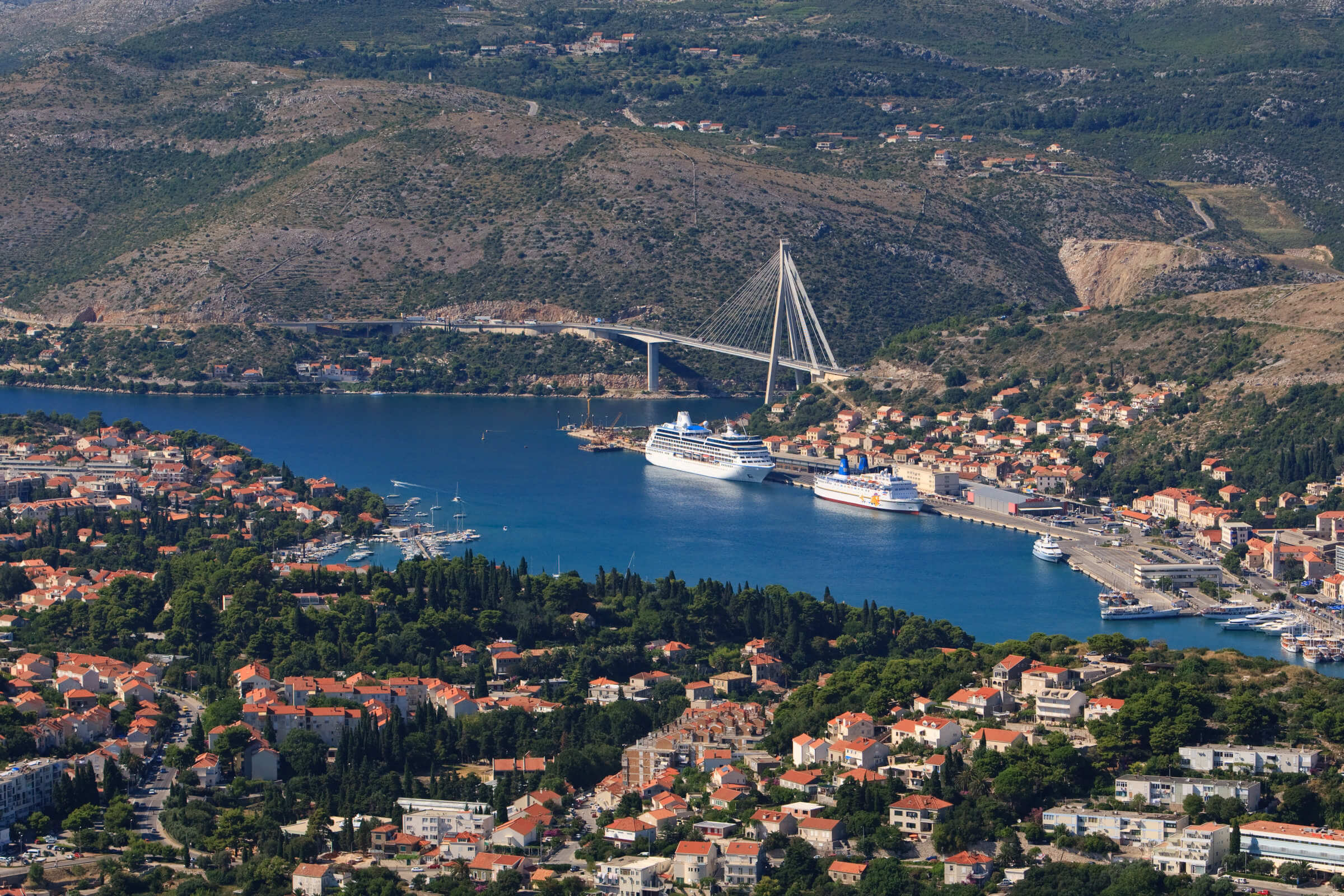
Photo: Mario Romulić
First of all, how to buy your ferry tickets? There are three ways. The first is via the official Jadrolinija website. In it, you can not only see the updated sailing schedules, but you can also buy your tickets online. Simply choose the port of departure, the port of destination, and the date of your trip, and you will find the available times. Once you have chosen the time and the number of tickets, in addition to completing all your personal information, you can proceed to pay for your tickets online with a credit or debit card.
The second way is through the official Jadrolinija mobile app, available on the Apple App Store and Google Playstore for Android. The application is very easy to use and, just like on the website, just select the port of departure and you will be able to see the ports that you can travel to from the one you selected. The process is very similar, and you will find that it is even more comfortable and intuitive to use. Payment also allows the use of credit and debit cards.
Finally, the third type of payment is the most traditional and has its benefits. All ferry ports in Croatia have a Jadrolinija office, where you can go to buy your tickets in person. Sometimes one can be a bit confused before buying their tickets both on the website and in the app, so having a Jadrolinija agent to guide you is a great help.
Where is the Dubrovnik ferry port located? Unlike previously covered cities like Split or Rijeka, the port of Dubrovnik is not located in the old part of the city. The port of Dubrovnik is located in Gruž Bay, a 10-minute drive from the Old Town.
Bari
Apart from Ancona, Bari is the other destination in Italy that one can reach from Croatia by sea. However, Bari can only be reached from Dubrovnik. The ferries that depart from the Pearl of the Adriatic to Bari depart on Sundays, Mondays, and Fridays through line 54 (Dubrovnik-Bari). Just one per day. On Sundays, they leave Dubrovnik at 12:00 pm and arrive in Bari at 19:30 pm, while on Mondays and Fridays they leave Dubrovnik at 21:00 pm and arrive in Bari at 8:00 am. Passengers can travel from Dubrovnik to Bari in three ways: deck passenger, seat, or cabin. For the adult ticket (from twelve years old or older), the deck passenger ticket price is 528 kunas, the seat ticket is 588 kunas, and there are two types of cabins: outdoor shower and WC (1193 kunas) and indoor shower. and WC (1097 kunas). For the child ticket (from 3 to 12 years old), the deck passenger ticket price is 303 kunas, the seat ticket is 363 kunas, and there are two types of cabins: outdoor shower and WC (228 kunas) and indoor shower. and WC (208 kunas).
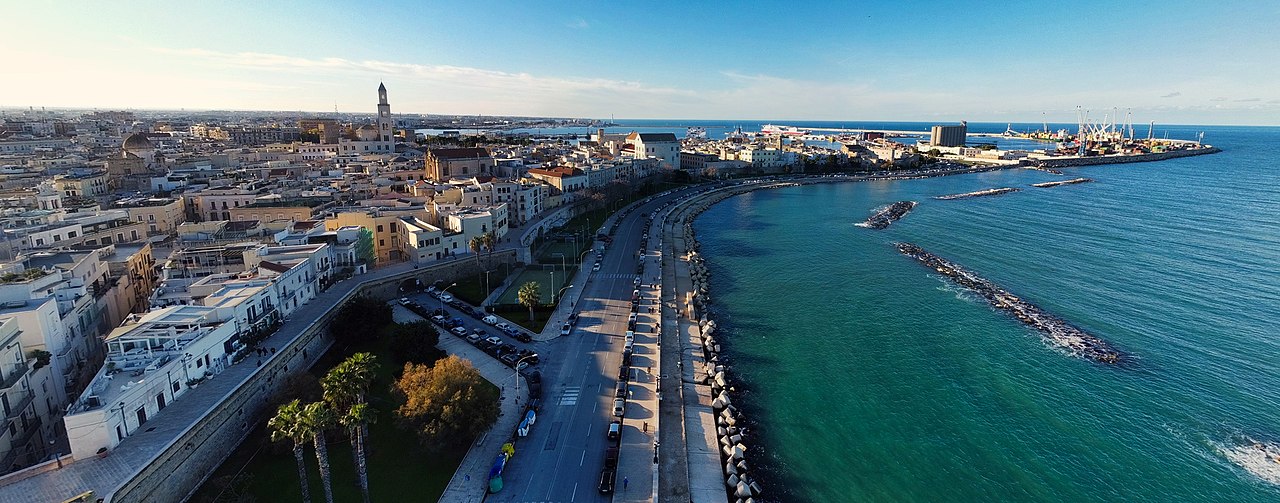
Image: Wikimedia Commons
Bol
Bol is one of the most sought-after island destinations in Croatia, and it is possible to get there from Dubrovnik. Every day, a catamaran leaves the port of Dubrovnik for Bol on the island of Brač. Through line 9811S (Dubrovnik - Korčula - Hvar - Bol - Split), the catamaran leaves Dubrovnik at 7:00 am and arrives in Bol at 11:40 am. The price of tickets, both for adults and children, is 280 kuna.
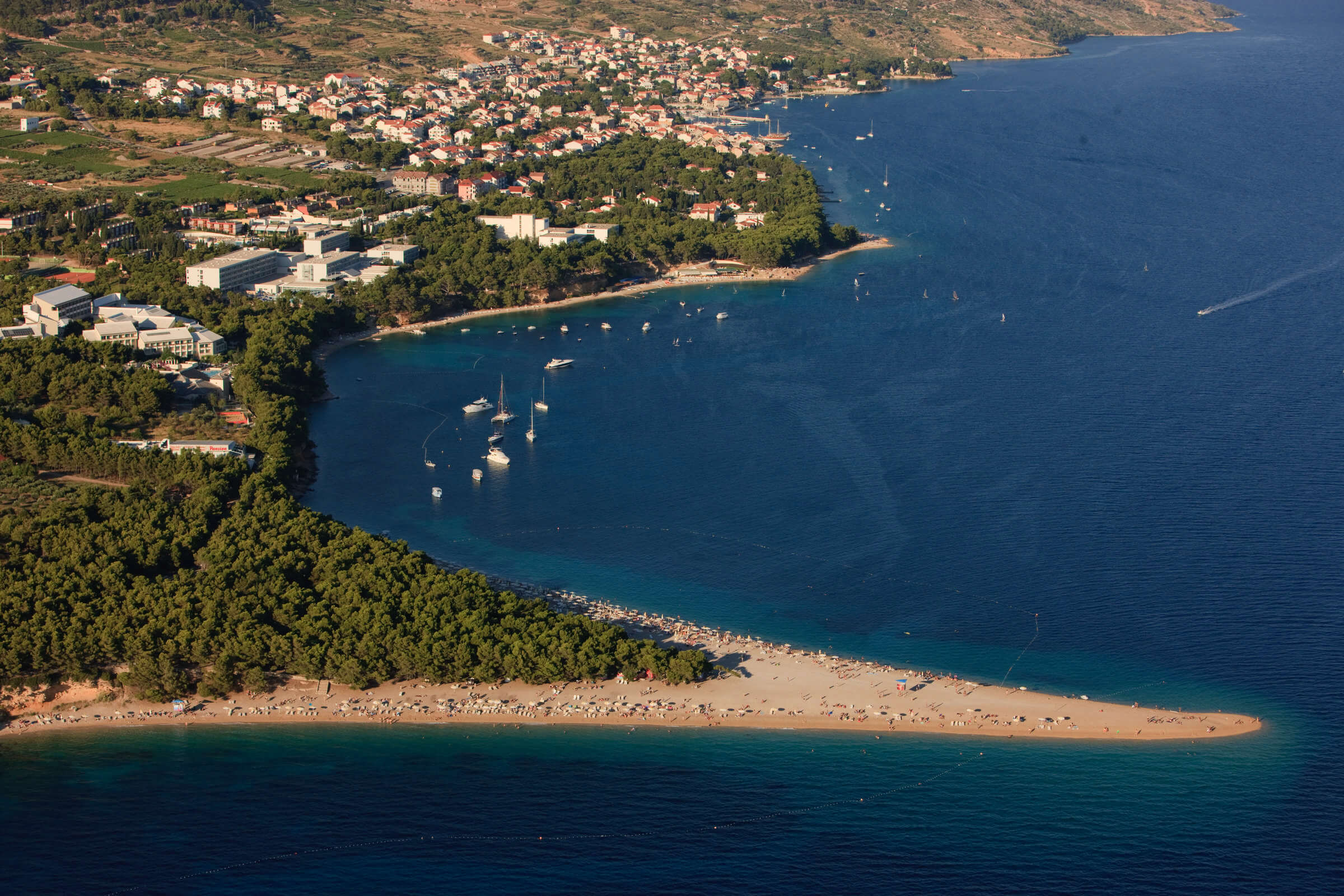
Photo: Mario Romulić
Hvar
One would think that to visit the wonderful island of Hvar, it is necessary to be in Split. However, if you are in Dubrovnik, you can do it too. Via line 9811S (Dubrovnik - Korčula - Hvar - Bol - Split), a catamaran departs from Dubrovnik at 7:00 am and arrives in Hvar Town at 10:30 am. Ticket prices for both adults and children are 280 kuna.
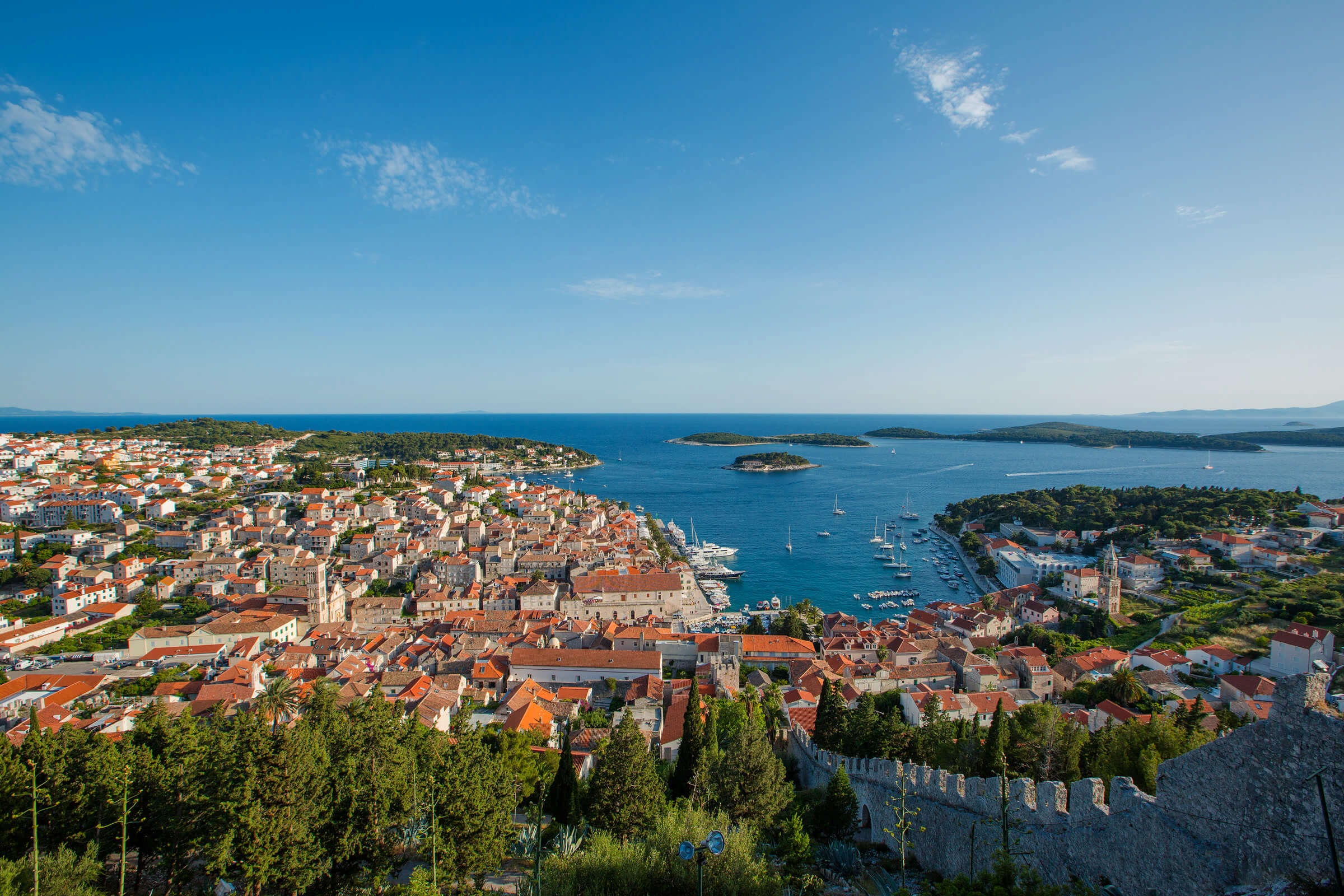
Photo: Mario Romulić
Koločep
The island of Koločep is one of the three inhabited Elaphiti Islands situated near the city of Dubrovnik. It is the southernmost inhabited island in Croatia. Two ferry lines go to Koločep: 831 (Dubrovnik - Suđurađ - Lopud) and 807 (Šipan - Lopud - Koločep - Dubrovnik). From Monday to Sunday, ships of line 807 depart for Koločep 5-6 times a day. The trip takes 30 minutes. Ferry line 831 departs from Dubrovnik on Mondays, Wednesdays, and Fridays, and only one trip per day. It leaves at 9:00 am and arrives in Koločep at 9:45 am. The price of the ferry ticket for adults is 31 kunas for both lines. Ticket prices for children vary. On line 831 it costs 15.5 kunas, and on line 807 it costs 12 kunas.
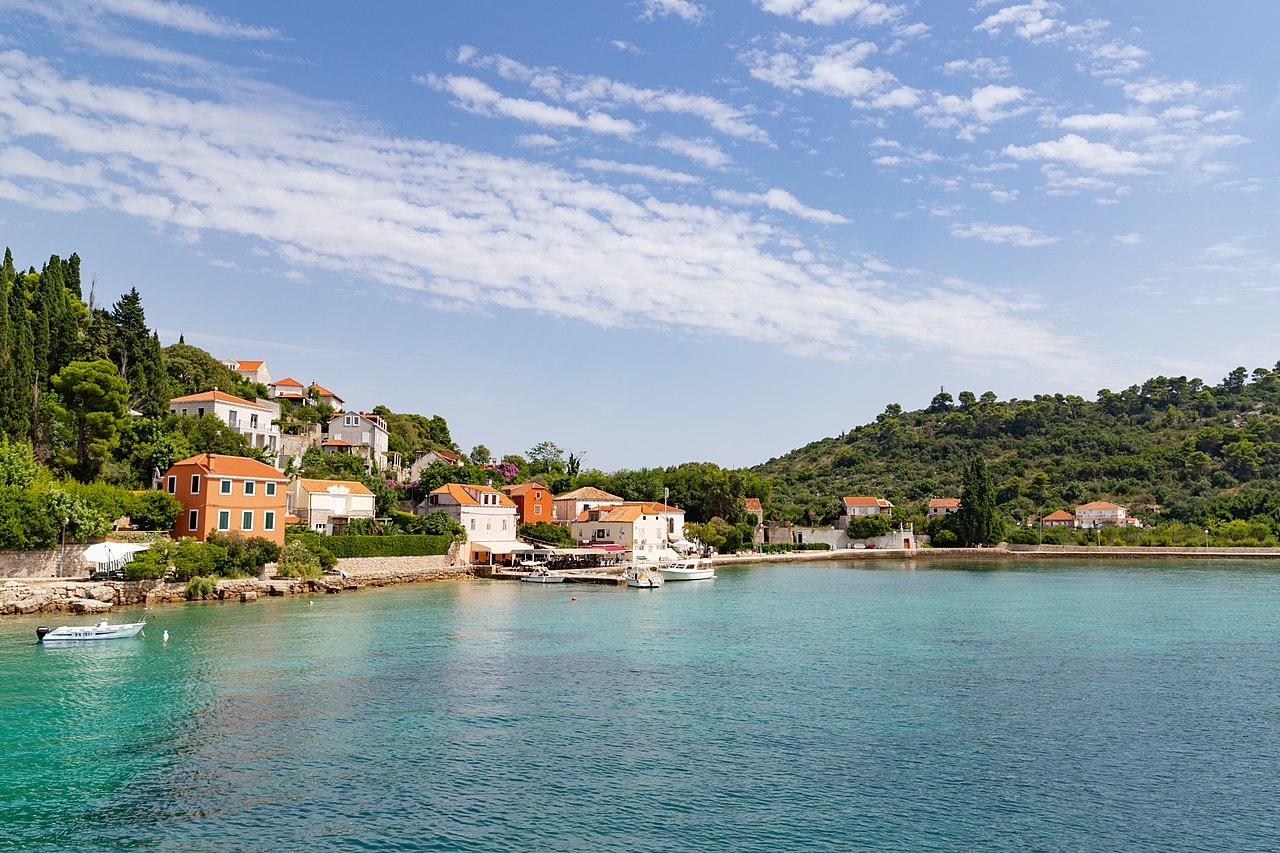
Photo: dronepicr/Wikimedia Commons
Korčula
Among the islands of Dubrovnik, the island of Korčula is surely the most popular. A catamaran of the line 9811S (Dubrovnik - Korčula - Hvar - Bol - Split) departs from the port of Dubrovnik every day, with only one trip per day. The catamaran departs at 07:00, arriving in Korčula at 09:00. Ideal for a day trip. The price of the catamaran ticket, both for adults and children, is 160 kuna.
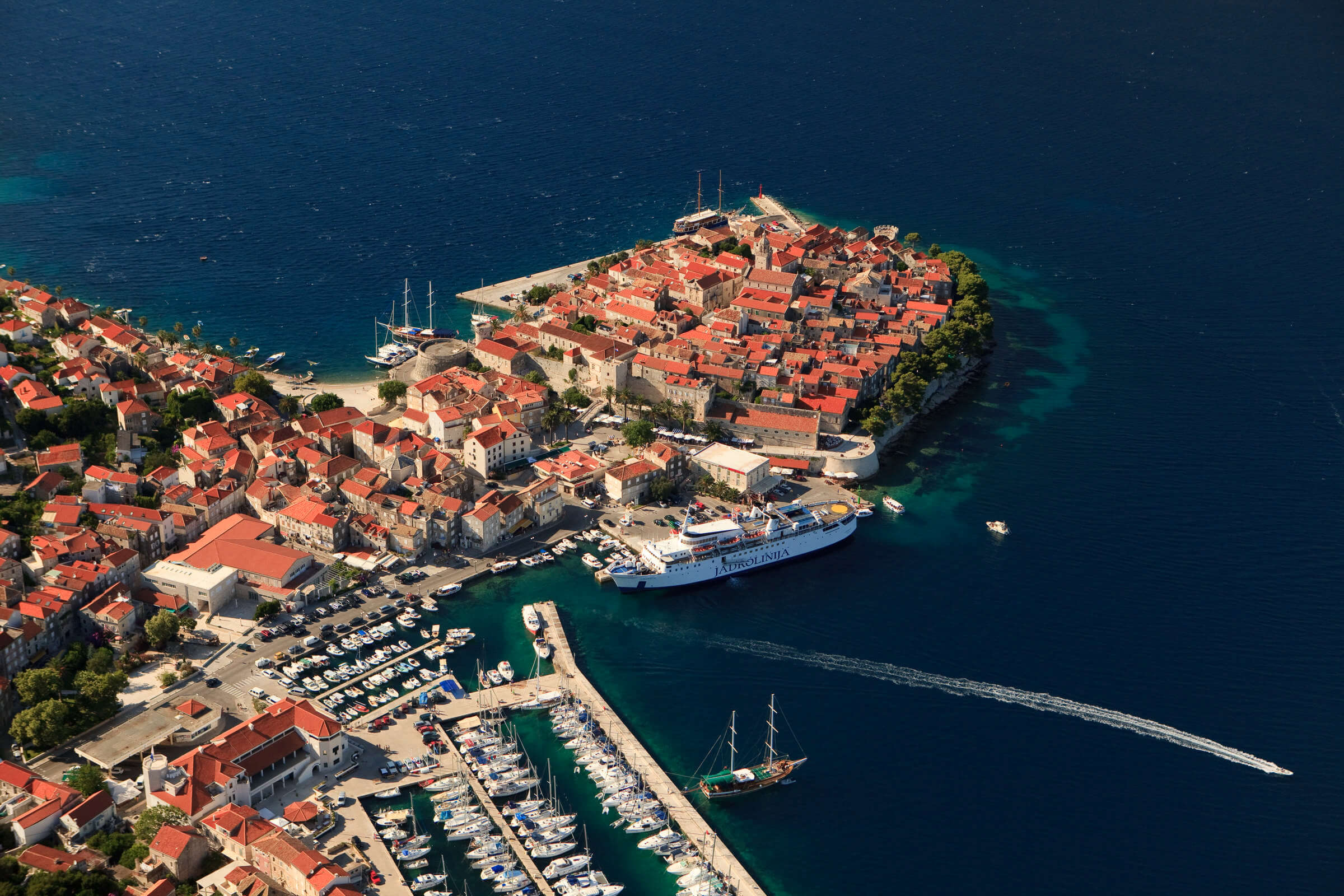
Photo: Mario Romulić
Lopud
Lopud, like Koločep, belongs to the Elaphite Islands archipelago. Lopud is the central island of the archipelago, well known for its sandy beaches, and is also the most developed of the three Elaphiti islands in terms of tourism. Like Koločep, two ferry lines go to the island of Lopud: 831 (Dubrovnik - Suđurađ - Lopud) and 807 (Šipan - Lopud - Koločep - Dubrovnik). From Monday to Sunday, ships of line 807 depart for Lopud 4-6 times a day. The trip usually takes 55 minutes. Ferry line 831 departs from Dubrovnik on Mondays, Wednesdays, and Fridays, and only one trip per day. It leaves at 9:00 am and arrives in Lopud at 10:25 am. The price of the ferry ticket for adults is 31 kunas for both lines. Ticket prices for children vary. On line 831 it costs 15.5 kunas, and on line 807 it costs 13 kunas.
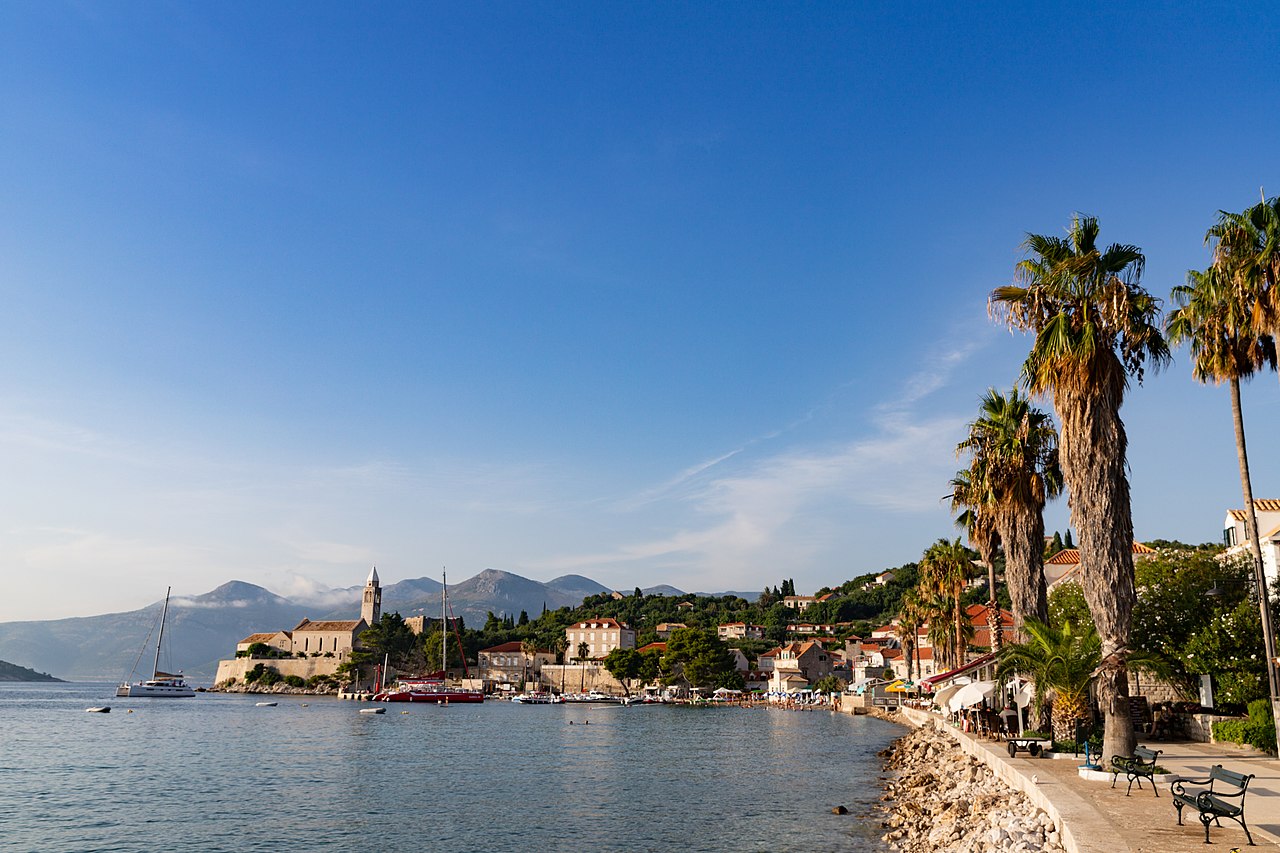
Photo: dronepicr/Wikimedia Commons
Suđurađ (Island of Šipan)
Šipan is the largest island of the Elaphiti Islands archipelago. Those going from Dubrovnik will arrive in the town of Suđurađ. In the case of Suđurađ, and compared to Lopud and Koločep, ferry line 831 is more frequent. On Mondays, Wednesdays, and Fridays, two ferries of line 831 depart from Dubrovnik to Suđurađ (9:00 am and 15:30 pm), while on Tuesdays, Thursdays, Saturdays, and Sundays, they make a single trip. Travel time can vary from 65 to 110 minutes. Ships of line 807 make up to 4 trips every day from the port of Dubrovnik to Suđurađ. Trips take 75 minutes. The price of the ferry ticket for adults is 31 kunas for both lines. Ticket prices for children vary. On line 831 it costs 15.5 kunas, and on line 807 it costs 14 kunas.
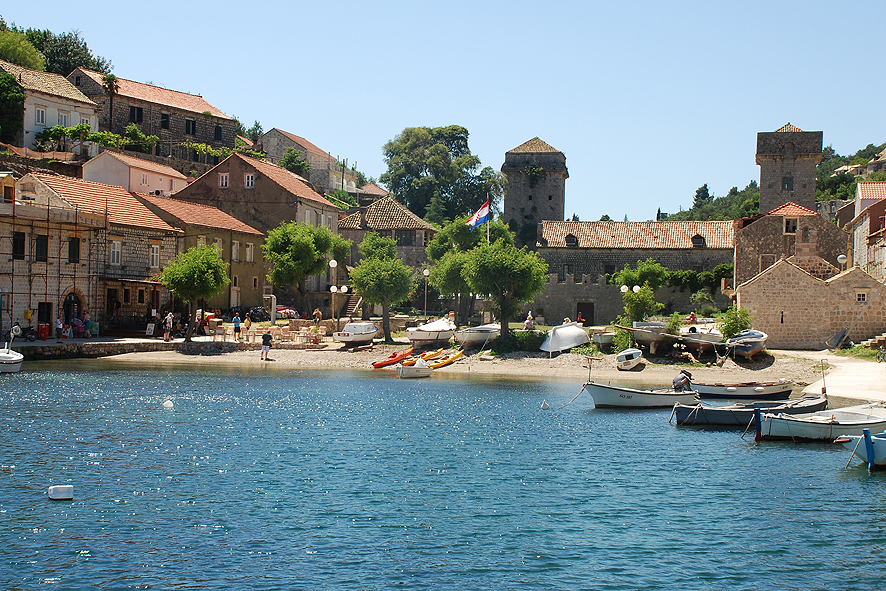
Photo: Dmitry Mozzhukhin/Wikimedia Commons
The ferry lines mentioned above are those with confirmed schedules for the next three months. Prices are subject to change. Visit the official Jadrolinija website for more information on other ferry lines from Dubrovnik.
For more on travel in Croatia, follow TCN's dedicated page.
ACAP New York: Kvarner Health Tourism Cluster and ACAP Sign Cooperation Agreement
June 25, 2022 - The Kvarner Health Tourism Cluster signed a Cooperation Agreement with the Association of Croatian American Professionals (ACAP) during the 6th Annual ACAP Conference in New York last weekend.
The Cluster and ACAP have been cooperating for two and a half years, and the signing of this Agreement marks the beginning of a new joint pilot project aimed at developing and launching an integrated medical and wellness program in Croatia for the American market, primarily the Croatian diaspora. This program will include personalized wellbeing and wellness programs aimed at long-term changes in health and lifestyle. With implementing this program, Croatia wants to position itself as a top international destination for health and quality of life. The signing of the Agreement was also attended by Nikolina Brnjac, Minister of Tourism and Sports, who expressed support for this business cooperation and further emphasized the focus on health and wellness tourism as a significant segment of sustainable offer and development.
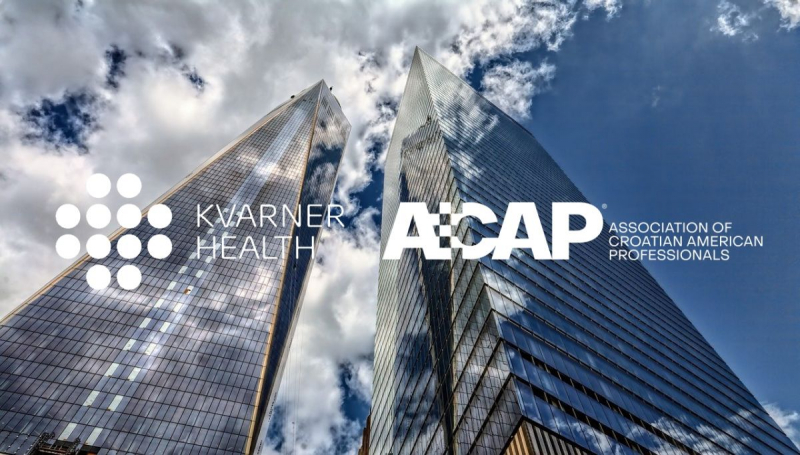
The Association of Croatian American Professionals (ACAP) gathers an international network of 2,000+ professionals across industries and academic communities. Sixteen chapters worldwide foster the ACAP mission of advancement for Croatian-American and Croatian professionals. ACAP also welcomes individuals of non-Croatian heritage who are active in the Croatian community. ACAP has endeavored to connect and inspire Croatian-American professionals from the USA and around the world to exchange ideas and engage in business collaboration while preserving the cultural heritage and stronger cooperation with Croatia. Their cooperation with the Kvarner Health Tourism Cluster began in 2019 during the stay of the ACAP Medical Tourism Committee and six postgraduates of Tuck School of Business – Dartmouth University, with the intention of talking to stakeholders in health tourism in Croatia and implementing the so-called Tuck's project to collaborate on health programs for the American market.
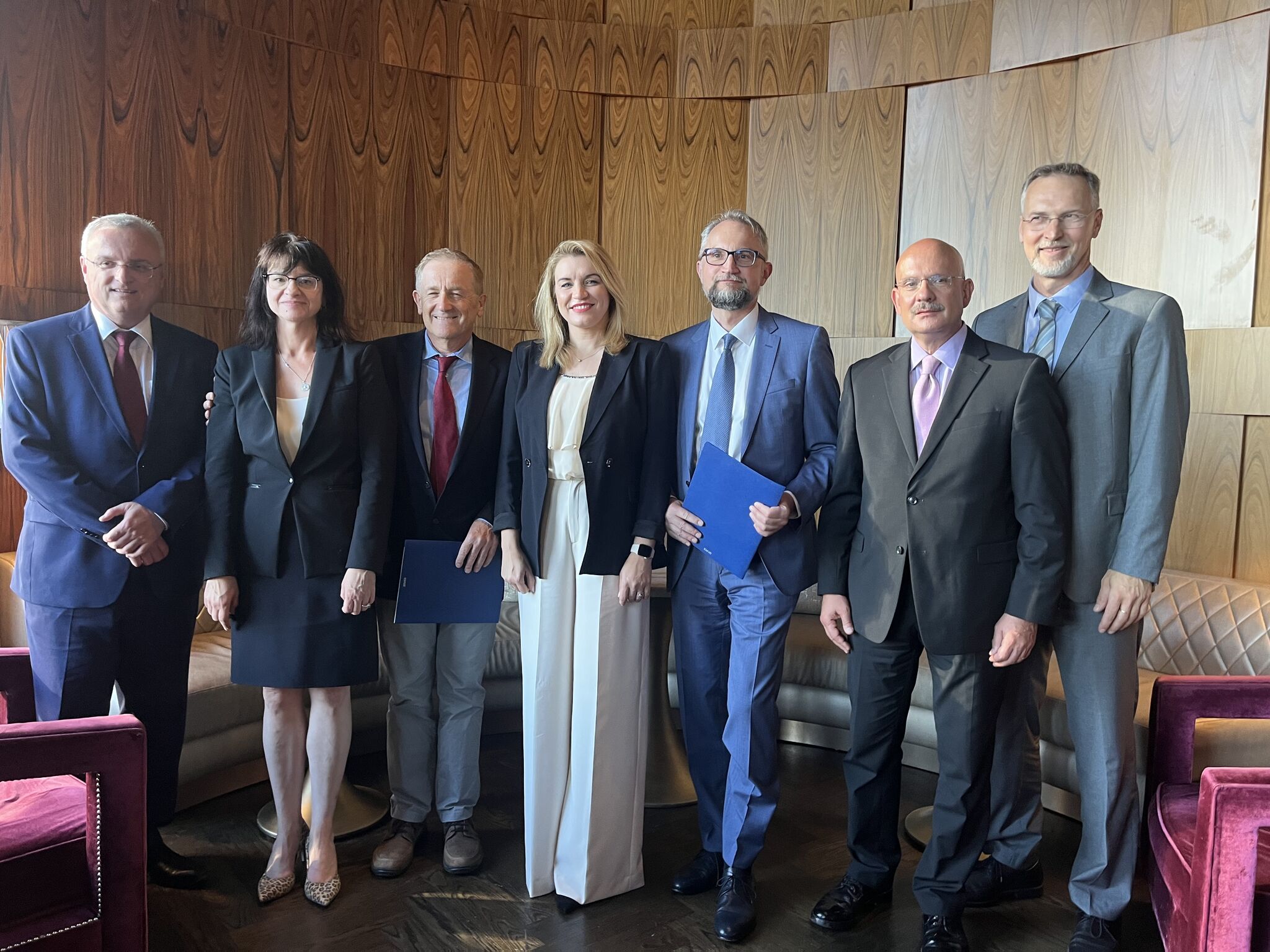
The cooperation agreement was signed during the 6th Annual ACAP Conference in New York, in which the Cluster participates with the support of the Kvarner Region Tourist Board. During the conference, all attendees had the opportunity to listen to the presentation "Croatia: World Destination for Healthy Living and Healthy Aging" as a part of the workshop of the ACAP Medical Tourism Committee, held by the President of the Cluster, assist. prof. Vladimir Mozetič, MD, PHD, MHA. The sixth annual conference organized by ACAP, entitled "An Evolving Mindset: Innovation, Collaboration, & Sustainability " was a strategic direction for the next decade through networking, learning and sharing ideas with more than 300 professionals active in the Croatian community in the USA, Croatia and throughout the world. The main speakers of this year's program included the most prominent Croatian business leaders and innovators: Mate Rimac (Rimac Group), Silvije Kutić (Infobip), Robert Herjavec (Herjavec Group and Shark Tank) and Pete Radovich (CBS Sports).
For more, make sure to check out our dedicated lifestyle section.
Croatia's COVID-19 Update: 1,087 New Cases, One Death, 398 Recoveries
ZAGREB, 25 June 2022 - In the last 24 hours there have been 1,087 new cases of the infection with coronavirus, one COVID patient has died, and 394 patients have recovered, Croatia's COVID-19 crisis management team reported on Saturday.
There are currently 3,598 active cases of COVID-19 disease in the country, and 210 of them are hospitalised patients ,including five placed on ventilators.
Since the first registered case of the infection with the novel virus in Croatia on 25 February 2020, as many as 1,145,053 cases of the infection have been diagnosed. To date, 16,049 patients have died of the disease, and there have been 1,125,407 recoveries, including 398 in the last 24 hours.
Nearly 69% of adults have fully been vaccinated.
Split Is Holding Snap Mayoral and Local Polls on Sunday
ZAGREB, 25 June 2022 - Early elections for the mayor and the city council will be held in Split on Sunday, slightly more than 12 months after the ordinary local elections which were held throughout Croatia in May 2022.
The snap polls in the second biggest Croatian city were called after Mayor Ivica Puljak and his two deputies, who were elected in 2022, tendered resignation on 8 April following a scandal involving Deputy Mayor Bojan Ivošević who threatened a local reporter and was subsequently indicted for intimidation. The Office of the State Prosecutor (DORH) in Spit issued the indictment on 23 March.
Upon their resignation, also members of the 31-seat City Council stepped down, paving the way for an early election for the town's legislative council.
On Sunday, the nine mayoral candidates will vie for the position: Ivica Puljak of the Centre party, Zoran Đogaš supported by the HDZ and the HSS parties, a former mayor Željko Kerum supported by his HGS party, Josip Markotić of the Bridge party, SDP representative Davor Matijević, an independent Ante Franić, Kristina Vidan of the Smart (Pametno) party, Tamara Visković of the We Can and the New Left parties and Aris Zlodre of the Homeland Movement.
Since Croatia gained independence, Puljak has been for the shortest period in the mayoral position of this Adriatic city, only ten months.
The election of the mayor in the first round of the polls requires the support of 50% plus one ballot. If none of the candidates manages to pass this threshold, the mayoral runoff will take place between the first two vote-getters in two weeks' time.
Ten slates have applied for the polls for the city assembly.
Pahor Says Blocking Croatia's EU Entry Talks Hardest Decision in His Career
ZAGREB, 25 June 2022 - Slovenia's President Borut Pahor said on Saturday that the most difficult decision which he had made in his political career had been to block Croatia's EU accession negotiations in his capacity as Prime Minister in 2008.
"Blocking Croatia was my most difficult political decision," Pahor told the Slovenian national broadcaster in his interview on the occasion of Slovenia's Statehood Day, observed on 25 June.
In December 2008, the Pahor cabinet vetoed the opening of new policy chapters in Croatia's EU accession negotiations over the border dispute between the two neighbouring countries.
The blockade was lifted only after Croatia's government led by Prime Minister Jadranka Kosor acceded to Slovenia's request to sign an arbitration agreement in late 2009.
Slovenia joined the EU in 2004, and Croatia in mid-2013.
In 2017, Croatia's government and parliament decided on withdrawing from the arbitration procedure after it was compromised by some of the Slovenian protagonists in the process.
Pahor's second presidential terms expires this year.
Law on Personal Assistance to Increase Number of Beneficiaries and Wages of Personal Asisstants
ZAGREB, 25 June 2022 - The law on personal assistance, which is likely to be enacted in Croatia in 2023, will very likely increase the wages of Personal Assistants (PAs) by 50% and also an estimated 15,000 persons with disabilities will be entitled to use the services of personal assistants.
"The new law will improve the quality of life of persons with the highest disabilities, as they will be entitled to more hours of personal assistance services and thus they will manage their time better, " Marica Mirić, a vice president of the Croatian Union of Associations of Persons with Disabilities (SOIH), Marica Mirić.
Furthermore, services of personal assistance also ease the burden on the families, she said in an interview with Hina.
The new legislation will pave the way for higher employment rates among persons with disabilities.
According to a time frame for the adoption of the law, the draft bill is to be forwarded to the government this autumn, and the parliament is expected to adopt it until the end of the year, according the information provided by the Labour, Family Affairs and Social Policy Ministry.
Awareness has been raised for years about the need for the adoption of legislation on personal assistance, and the issue has recently grabbed public attention when a former member of parliament, who is a person in wheelchair, went public with her unfortunate experience when her personal assistant attacked and robbed her in her flat.
There are several types of personal assistance services: services for persons with physical, mental and intellectual disabilities, personal attendants for visually impaired persons, communication assistants for deaf persons and assistants for deaf-blind service (DBS).
So far personal assistance services have been organised through programmes and projects of civil society associations, which are funded by the European Social Fund and the state budget.
The adoption of the law will regulate this area better, and define the models and contents of the services, entitlements to the services, qualifications for employment of personal assistants, monitoring and supervision of provision of services, possibilities for compensation for damage and financing.
In March this year, Croatia had 612,212 persons registered with various kinds and degrees of disabilities.
According to the social policy ministry, 2,312 persons with physical or mental disabilities used services of 2,292 personal assistants, according to a state of affairs registered in May.
Furthermore, 3,654 beneficiaries used services of a total of 99 communication assistants.
There were 67 personal attendants for 1,537 beneficiaries with visual impairment.
According to the ministry, the allocation set aside annually for all those services is HRK 148 million (approximately 20 million euros).
The ministry estimates that the potential number of users of personal assistance services can rise to 15,000 upon the adoption with the law.


